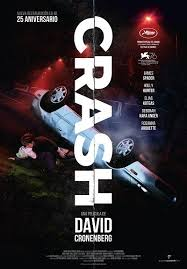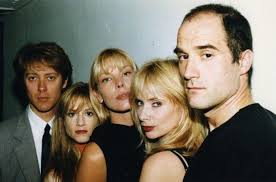Semi Conversation About Crash (1996) - David Cronenberg Review

Hello everyone, today I want to share with you a new way to make a review. I was talking with my girl about this film and for to inmortalize our conversations I deciced to introduce a narrator with our nick into the text. Enjoy it!!!
David Cronenberg’s Crash (1996) is a film that refuses to be loved or loathed passively. Based on J.G. Ballard’s novel, this psychosexual odyssey dissects humanity’s morbid fascination with merging trauma, technology, and eroticism. Through fragmented conversations and polarized reactions, viewers are left to grapple with its icy, clinical gaze—a gaze that both seduces and repels.
A World of Shattered Glass and Psyches
The film orbits a subculture of “crash survivors” who eroticize car accidents, treating scars and twisted metal as fetish objects. James Spader’s James Ballard and Deborah Kara Unger’s Catherine drift through this liminal space, their hollow marriage reignited by collisions. Enter Vaughan (Elias Koteas), a self-appointed “prophet” of vehicular violence, whose charisma borders on menace. Cronenberg frames their interactions with sterile precision, mirroring the characters’ emotional detachment. Yet beneath the chrome-and-leather aesthetic lies a simmering unease—a tension between intellectual curiosity and visceral disgust.
Divergent Reactions: Hedonism vs. Horror
The dialogue between viewers Darketo and Mello encapsulates the film’s polarizing power. Darketo (7/10) praises its “primal, impulsive” eroticism, particularly Vaughan’s unapologetic surrender to his obsessions. For him, the film’s explicitness feels “pure,” even liberating—a dopamine rush of taboo-breaking. The queer undertones, notably a tender male-male scene, are celebrated as “natural” and “beautiful,” contrasting with mainstream portrayals.
Mello, however, recoils at what she interprets as violation. Vaughan’s manipulation of women—especially a hospital scene where consent feels ambiguous—triggers visceral discomfort. “It’s not erotic; it’s submission,” she argues, linking her unease to gendered empathy. Cronenberg’s clinical framing amplifies this dissonance: Is this a critique of objectification, or a complicit gaze? The film refuses to answer, leaving viewers stranded in moral limbo.
Narrative Ambiguity: Feature or Flaw?
Darketo critiques the film’s “diffuse” structure, noting the lack of clear character motivations or external context. Relationships exist in a vacuum, with minimal interaction beyond their niche fetishism. This deliberate ambiguity frustrates traditional narrative cravings—are these characters seeking meaning, or simply chasing sensation? Mello defends this as intentional, a “state of nature” reflecting the characters’ psychological disintegration. Yet both agree the blonde character (Rosanna Arquette’s Gabrielle) feels undercooked, her role reduced to a prosthetic-laden spectacle.
Cronenberg’s Cold Precision
The director’s signature clinical style—sterile lighting, dispassionate sex scenes—mirrors the characters’ emotional numbness. For Darketo, this aesthetic is hypnotic; for Mello, it’s alienating. The film’s most debated moment—Vaughan’s final “performance”—epitomizes this divide. Is it a transcendent embrace of destiny, or a nihilistic punchline? Cronenberg offers no solace, only a rearview mirror reflecting our own discomfort.
Conclusion: A Collision of Perspectives
Crash is less a film than a Rorschach test. Its 7/10 rating from Darketo acknowledges its flaws (repetition, flat emotional beats) while celebrating its audacity. For Mello, its importance lies in its ability to provoke—to “make you suffer” while dissecting paraphilias and power dynamics. Cronenberg’s masterpiece (or provocation) remains a litmus test for viewers: Are you aroused, appalled, or both? In the end, Crash leaves us all dented—and wondering why we can’t look away.
A flawed, unforgettable trip into the abyss. Not for the faint of heart—or the morally certain.


It's fascinating how the film's clinical precision and ambiguous narrative elicit such divergent opinions, challenging our perceptions of morality and storytelling. Definitely a thought-provoking film that leaves a lasting impression. Thanks for sharing this intriguing review
To you for take your time to read. We are people with a lot of love but different opinions, jajaja. The woman sensitivity and empathy it's a main factor too